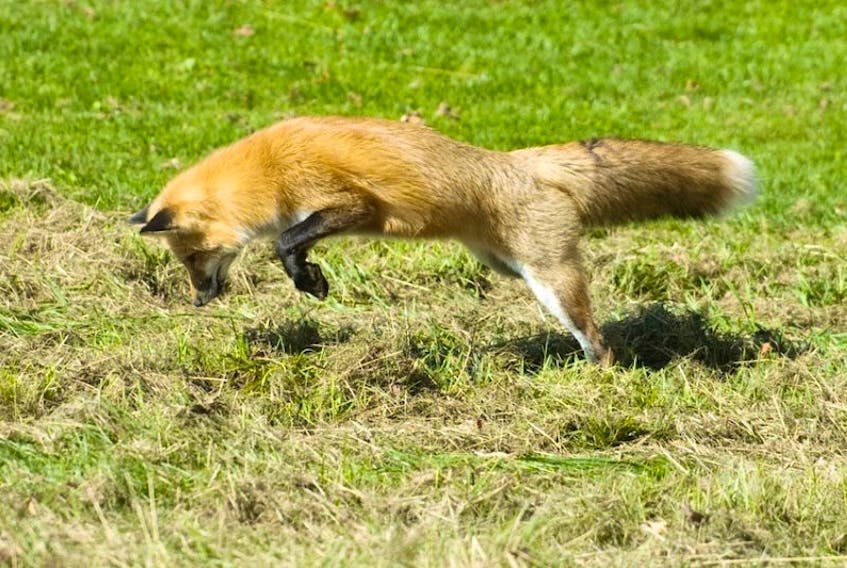Don't feed the foxes: that's a message residents in Charlottetown will likely be hearing soon.
Coun. David MacDonald, chairman of the protective and emergency services committee, said there is going to be a meeting soon between multiple groups trying to deal with the number of wild foxes in the capital city.
That meeting will involve researchers at UPEI looking at the issue and provincial wildlife officials.
It isn't sounding like there is going to be an actual bylaw that would penalize residents for feeding these animals. It's hard to enforce one provincewide, much less in the city.
One resident called MacDonald recently to complain that a neighbour was feeding wild foxes twice a day.
"Twice a day on her neighbour's driveway there's between 12 and 15 foxes congregating because this neighbour feeds them,'' MacDonald said. "The fox is not the issue. It's the fact that people are creating these hotspots where the foxes congregate. These are wild animals. They are generally very docile and are not a threat to humans but they could be to pets.''
Researchers at UPEI have been attaching transponders to the necks of some foxes to give them an idea where the foxes are going and where the trouble spots are.
In one piece of data wildlife officials analyzed, there were 4,000 areas where one particular fox went over a one-month period but there was one specific area where 2,000 foxes were visiting on a regular basis.
"It turns out this particular area was where foxes were being fed so while foxes might routinely go from point A to point B and to point C in their area, they might go 10 particular times to this hotspot area.''
As one wildlife officer said, foxes, like any animal, search for three things: food, shelter and water. And all are plentiful in Charlottetown.
"It's like a smorgasbord for foxes,'' MacDonald said. "When you start treating foxes like pets they start showing up at mealtime. It does put real pets in danger and it really puts the fox in danger because it takes them out of the way they do things; out of their natural habitat.''
The end result isn't going to be a bylaw but most likely an education campaign.
"There is talk that we are going to have some kind of information session in the parks where we're going to explain to the residents how what they're doing is not in the best interest of the foxes or the city or themselves.''
Don't feed the foxes: that's a message residents in Charlottetown will likely be hearing soon.
Coun. David MacDonald, chairman of the protective and emergency services committee, said there is going to be a meeting soon between multiple groups trying to deal with the number of wild foxes in the capital city.
That meeting will involve researchers at UPEI looking at the issue and provincial wildlife officials.
It isn't sounding like there is going to be an actual bylaw that would penalize residents for feeding these animals. It's hard to enforce one provincewide, much less in the city.
One resident called MacDonald recently to complain that a neighbour was feeding wild foxes twice a day.
"Twice a day on her neighbour's driveway there's between 12 and 15 foxes congregating because this neighbour feeds them,'' MacDonald said. "The fox is not the issue. It's the fact that people are creating these hotspots where the foxes congregate. These are wild animals. They are generally very docile and are not a threat to humans but they could be to pets.''
Researchers at UPEI have been attaching transponders to the necks of some foxes to give them an idea where the foxes are going and where the trouble spots are.
In one piece of data wildlife officials analyzed, there were 4,000 areas where one particular fox went over a one-month period but there was one specific area where 2,000 foxes were visiting on a regular basis.
"It turns out this particular area was where foxes were being fed so while foxes might routinely go from point A to point B and to point C in their area, they might go 10 particular times to this hotspot area.''
As one wildlife officer said, foxes, like any animal, search for three things: food, shelter and water. And all are plentiful in Charlottetown.
"It's like a smorgasbord for foxes,'' MacDonald said. "When you start treating foxes like pets they start showing up at mealtime. It does put real pets in danger and it really puts the fox in danger because it takes them out of the way they do things; out of their natural habitat.''
The end result isn't going to be a bylaw but most likely an education campaign.
"There is talk that we are going to have some kind of information session in the parks where we're going to explain to the residents how what they're doing is not in the best interest of the foxes or the city or themselves.''









